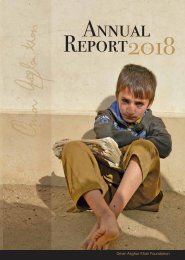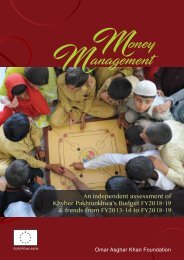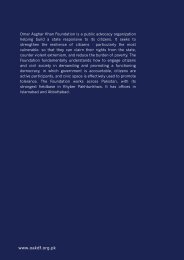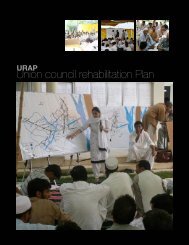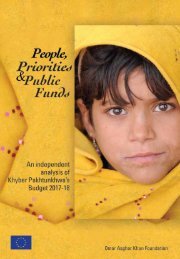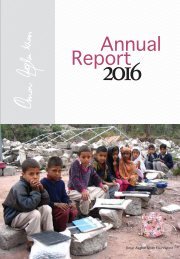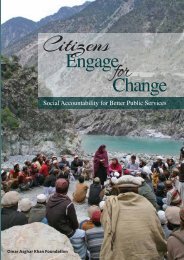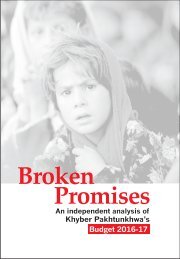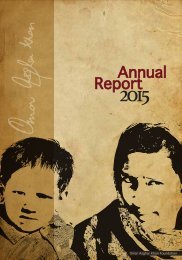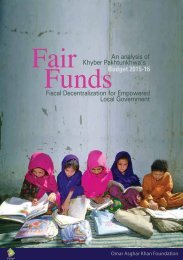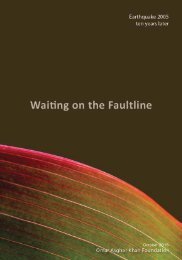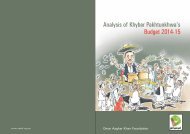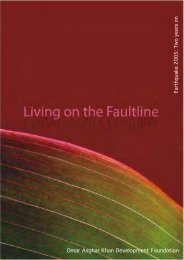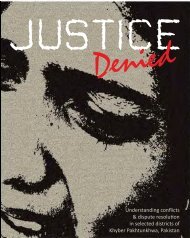Money Matters
You also want an ePaper? Increase the reach of your titles
YUMPU automatically turns print PDFs into web optimized ePapers that Google loves.
<strong>Money</strong><br />
<strong>Matters</strong><br />
An analysis of<br />
Khyber Pakhtunkhwa<br />
Budget 2011-12<br />
Omar Asghar Khan Foundation
Established in 1999, Omar Asghar Khan Foundation is<br />
creating opportunities for people, particularly the<br />
vulnerable, to collectively secure human and livelihood<br />
rights by strengthening their asset base and making<br />
institutions and policies pro-‐poor. The Foundation’s<br />
field-‐based work is primarily in Khyber Pakhtunkhwa. Its<br />
advocacy has a national focus. The Foundation has offices<br />
in Islamabad and Abbottabad.
MONEY MATTERS<br />
An Analysis of Khyber Pakhtunkhwa’s Budget 2011-12<br />
Omar Asghar Khan Foundation<br />
August 2011
Bringing citizens together so that they may raise their voices and demand their rights<br />
Omar Asghar Khan Foundation
Introduction<br />
Unallocable or unaccountable<br />
Inequitable and alienating<br />
Compounding disasters<br />
Smaller provinces: for identity, control and equity<br />
Public Recommendations<br />
Citizen Voices: it is critical to question budget priorities<br />
2<br />
4<br />
6<br />
8<br />
12<br />
13<br />
14
Introduction<br />
Drums roll, crowds cheer, and rose petals<br />
are showered as the local politician lays a<br />
foundation stone of an additional classroom<br />
in a village school. The gathering expresses<br />
deferential gratitude as the local politician<br />
makes sanctimonious claims of serving<br />
people’s interests. The script of this typical<br />
scene would perhaps be very different if<br />
people were more familiar with budget<br />
processes, their rightful share in allocations<br />
and the role they must demand of their<br />
representatives.<br />
Public budgets are presented, debated and<br />
passed by parliaments. Khyber<br />
Pakhtunkwa’s Budget 2011-‐12 was<br />
presented on 11th June 2011 and passed<br />
after just six parliamentary sessions on 21st<br />
June 2011. The review of the approved<br />
budget indicates that much needed to be<br />
debated and even challenged so that public<br />
finances are efficiently used to benefit all<br />
citizens living within Khyber Pakhtunkhwa.<br />
2
Public funds hidden from public scrutiny<br />
More than two-‐third of KPK’s Annual Development Programme 2011-‐12 does not specify locations<br />
3
Unallocable or unaccountable?<br />
Annual budgets indicate a government’s<br />
intent and priorities. These are shrouded in<br />
mystery if amounts are allocated without<br />
giving details of where their use is intended.<br />
KPK’s budget 2011-‐12 shows that out of a<br />
total development outlay of Rs.85.14<br />
billion, Rs.57 billion is categorized as<br />
unallocable or block funds. In other words, it<br />
is not clear where 67% or more than<br />
two-‐third of its total development budget<br />
will be spent.<br />
Block allocations allow tremendous<br />
discretion to politicians and bureaucrats to<br />
move funds around within the purpose<br />
stated for the block. Doubts about<br />
transparency of unallocable funds and their<br />
equitable use abound in the context of<br />
Pakistan where patronage politics prevails.<br />
Such doubts are compounded when<br />
evidence of misuse regularly surface. A<br />
review of expenditure details of FY2010-‐11<br />
show that a block allocation of Rs.300<br />
million for educational scholarships<br />
intended for students from across the KPK<br />
province was entirely spent in one district.<br />
Not surprisingly, the privileged district was<br />
Mardan – the home district of the Chief<br />
Minister.<br />
Similarly, a total of Rs.576.54 million was<br />
spent on education in District Mardan<br />
against an original allocation of Rs.4.54<br />
million in the budget 2010-‐11. In sharp<br />
contrast, Hazara’s five districts were<br />
allocated Rs.83.3 million but only about half<br />
of this amount was spent.<br />
60<br />
50<br />
40<br />
30<br />
20<br />
10<br />
ADP allocated to specific districts<br />
Unallocable block funds<br />
Pak.Rs. in billions<br />
0<br />
FY2010-11<br />
FY2011-12<br />
4
5<br />
Equitable distribution of resources will help build a nation that cares
Inequitable and alienating<br />
Development funds in KPK’s budget that are<br />
allocated to specific districts raise<br />
fundamental questions about the right of<br />
every citizen to an equitable share of the<br />
province’s resources and to equal<br />
opportunities.<br />
The agreed weighting for determining<br />
allocation is 82% for size of population;<br />
10.3% for level of poverty; 5% for revenue<br />
capacity (2.5% for revenue generation and<br />
2.5% for revenue collection); and 2.7% for<br />
geographical area.<br />
The southern districts of the province have<br />
received 2.8% of the total development<br />
budget, and Hazara has received 6.1%. The<br />
criteria used for distributing resources are<br />
not clear. In 2009 the 7th National Finance<br />
Commission award was signed representing<br />
an agreement for the annual distribution of<br />
resources among provinces by the federal<br />
government.<br />
If the NFC criteria are adopted for<br />
distributing resources among districts by the<br />
provincial government, the share of the<br />
southern districts would be 21% or Rs.17.88<br />
billion. Similarly, Hazara’s share would be<br />
19.4%, or an estimated Rs.11.3 billion more<br />
than its allocated share in FY2011-‐12 -‐-‐ an<br />
amount that would roughly cover the cost of<br />
constructing 11,000 new classrooms.<br />
18<br />
16<br />
14<br />
12<br />
10<br />
8<br />
6<br />
4<br />
Allocated ADP 2011-12<br />
Due share applying NFC criteria<br />
Pak.Rs. in billions<br />
2<br />
0<br />
Southern districts<br />
Hazara<br />
6
Women would not have to walk miles to fetch water<br />
if Hazara received its due share of development funds<br />
Over the two-‐year period 2010-‐12, Hazara<br />
has cumulatively received an estimated<br />
Rs.20.8 billion less than its due share. This<br />
amount could have provided clean drinking<br />
water to every hamlet in Hazara or<br />
constructed a network of 4,000 km of roads<br />
linking every hamlet of village to a metalled<br />
road and to education and health facilities.<br />
Half of the Rs.20.8 billion, if allocated,<br />
could have created education facilities in<br />
Hazara for 330,000 students or upgraded<br />
two BHUs to RHCs in each union council of<br />
the six districts of Hazara.<br />
7
Compounding disasters<br />
Inequity in development funds is also<br />
extended to disaster-‐related support.<br />
Monsoon rains in July 2010 triggered the<br />
worst-‐ever flood that swept through<br />
Pakistan. 1,068 lives were lost in KPK, an<br />
estimated 116,000 homes were totally<br />
destroyed and more than four million people<br />
were directly affected. The province’s<br />
overall financial losses were estimated at<br />
Rs.176 billion.<br />
Admittedly the scale of the disaster would<br />
overwhelm most governments. Nevertheless<br />
public expectation that the government<br />
would extend all possible support to<br />
affected populations is not misplaced. An<br />
analysis of KPK’s flood-‐related expenditures<br />
sadly presents reprehensible evidence that<br />
the KPK government chose political<br />
expediency even in the face of agonizing<br />
human tragedy.<br />
8
According to government data, Kohistan is<br />
among the severest flood-‐affected districts<br />
of KPK, with an affected population of<br />
464,333. It is also among the poorest. And<br />
yet it was allocated a meager Rs.16.8<br />
million out of the total allocation of Rs.7.8<br />
billion for flood relief from the provincial<br />
budget of 2010-‐11. According to the number<br />
of affected, Kohistan’s due share should<br />
have been Rs.948 million. District Mardan on<br />
the other hand, classified among the least<br />
affected with only 19,992 affected people,<br />
received Rs.237.4 million.<br />
500,000<br />
450,000<br />
400,000<br />
350,000<br />
300,000<br />
250,000<br />
Number of directly affected people<br />
Amount of relief allocated in FY2010-11<br />
Pak Rs. in 000’s<br />
200,000<br />
150,000<br />
100,000<br />
50,000<br />
0<br />
Mardan<br />
Kohistan<br />
9
People of Kohistan’s Kandian Valley trek for days to reach their homes<br />
as the roads washed away by the 2010 flood have not yet been rehabilitated<br />
The injustice continued in the following<br />
year’s budget. Rs.8.46 billion was set aside<br />
for flood rehabilitation in KPK’s budget<br />
2011-‐12. More than two third of the amount<br />
is retained as block funds. Of the allocated<br />
amount, Kohistan, which accounted for 12%<br />
of the total affected people in KPK, was only<br />
allocated Rs.25 million. Based on the<br />
numbers of affected, Kohistan’s due share in<br />
flood rehabilitation funds should be more<br />
than one billion, an estimated forty times<br />
more than the amount actually allocated in<br />
FY2011-‐12.<br />
10
11<br />
Some get more than others -‐-‐ increasing public alienation and social exclusion
Smaller provinces: for identity, control and equity<br />
Many believe that compulsions of politics<br />
will continue placing pressures that result in<br />
inequitable distribution of resources. The<br />
size of provinces and limited capacity also<br />
make it increasingly difficult for provincial<br />
governments to respond to people’s diverse<br />
needs or to realize the often abundant but<br />
untapped potential for growth.<br />
Calls for smaller provinces are grounded in<br />
the belief that greater control over<br />
resources leads to more equitable<br />
development. Accountability and access to<br />
government will become easier. Citizens will<br />
be able to monitor the budget making and<br />
implementing processes. Resources will be<br />
better identified and developed effectively.<br />
Increasing public alienation and social<br />
exclusion are reinforcing demands for<br />
smaller provinces in Pakistan. The cases of<br />
Hazara, Seraiki and Bahawalpur provinces<br />
have significant public backing as viable<br />
means of achieving more representative and<br />
efficient governance.<br />
The arguments for smaller provinces are not<br />
merely premised on administrative<br />
efficiency. Social, geographic and historic<br />
bonds are the foundation of the popular<br />
demand for a Hazara province. It seeks<br />
recognition of a shared history, an<br />
affirmation of a collective identity, and<br />
reflects a multi-‐ethnic peoples acceptance<br />
of each other’s right to shared resources.<br />
People of Hazara demand a separate province<br />
12
Public Recommendations<br />
Eradicate block development funds by specifying locations<br />
Establish criteria similar to the NFC for allocation of the<br />
total ADP funds<br />
Empower the provincial finance commission to monitor<br />
budget allocations for the complete ADP and not only for<br />
district development funds<br />
Abolish all discretionary powers and allocations held by<br />
chief ministers and public representatives<br />
Make constitutional amendments to simplify the process of<br />
creating more provinces<br />
13
Citizen Voices: it is critical to question budget priorities<br />
Why are imminently sensible options not<br />
taken or ignored when deciding the use of<br />
public funds? Is it the lack of transparency<br />
and access to relevant information that<br />
nurtures a political ethos steeped in<br />
patronage? Is a mediocre leadership stripped<br />
of any sense of service to blame? Or is it due<br />
to citizen voices too faint to effectively<br />
demand accountability? Perhaps it’s a mix of<br />
all these factors.<br />
The misuse of public funds can be a divisive<br />
force that creates distances between<br />
peoples, promotes a lack of trust in the<br />
state and its institutions and fuels the<br />
spread of hate.<br />
Many of the challenges faced by Pakistan<br />
today may be traced to impropriety in use of<br />
public funds for the benefit of all its<br />
citizens.<br />
14
Equitable and effective use of public monies<br />
and national resources is the greatest<br />
contributor to a people’s sense of<br />
participation or belonging and is a force that<br />
can bind people together. Its judicious use<br />
can put a country on the path to progress<br />
and also spur its citizens to play a much<br />
more responsible role in its development.<br />
Transparency and accountability are rights<br />
that can ensure the nation’s progress. It is<br />
time that citizens play a role in changing<br />
destinies and holding representatives<br />
accountable.<br />
Citizens are asking questions:<br />
Where is my money?<br />
How is it spent?<br />
Use it to change my life….<br />
.… and I demand you do it now!<br />
It is my money after all!<br />
15
August 2011<br />
The use of any material from this publication is encouraged. Acknowledgement is requested.<br />
Front cover picture: Child playing with debris of a house destroyed by the 2010 floods<br />
Charsadda, Khyber Pakhtunkhwa<br />
17
www.oakdf.org.pk




